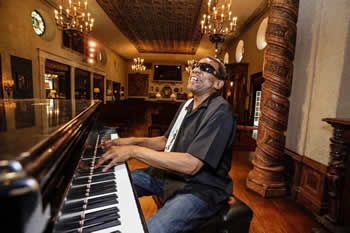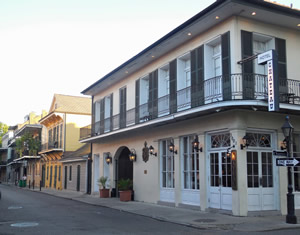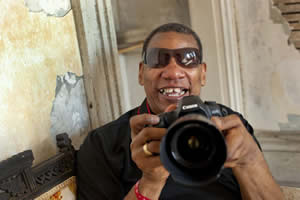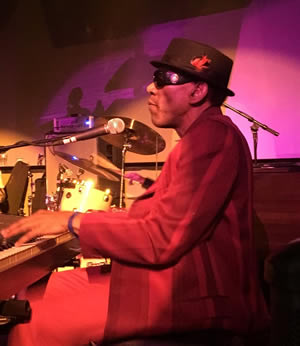In Memoriam: Henry Butler, 1948-2018
A Tribute to
One of the
Most Interesting Men I’ve Ever
Met
by Scott Thomas Anderson
The Ledger Dispatch

On any given night you can find him in a crowded auditorium--the smoky, scarlet lights warming his dark glasses and fedora, glittering like a hot disco-ball on the tip of his microphone. Fingers revving, his deep voice glides over the steady stomp of his piano, trucking along with fire and finesse until everyone in the room is bathed in a pure stream of the blues.
It’s a cold January evening in the hills of California and Henry Butler is far from the New Orleans “Homeland” that his album is named after. He sits in front of a piano in faded Art Deco theater, surrounded by a crowd of restless strangers who don’t know his music. But that’s nothing. Since the day he was born in Charity Hospital in 1949, Butler’s creative energy has always defied the odds--and tonight he’ll make these Californians understand why.
The theater finally goes silent. Butler rolls his hands across the piano keys.
The Boy from Uptown
Technically speaking, Butler has never had the advantage of sight; though being born in the most unique musical city in the world offered plenty to stimulate his inner vision.
“Growing up in New Orleans had a profound impact on me,” Butler remembers. “It’s a city that created jazz. The rhythmic foundation there is so phenomenal — and it’s all around you. A person can’t be immersed in those influences without the experience affecting their musical understanding and their overall senses.”
The raucous movements of the Crescent City always hypnotized Butler. He lived in same Uptown neighborhood that produced the first lightening rods, Buddy Bolden, Louis Armstrong and King Oliver. By the time Butler was 6, he was learning piano. By the time he was in 11th grade, he was studying music at the Louisiana State School for the Blind.
While sharpening his skills as a pianist, Butler was also training in European operas. That led to a master’s degree in voice, and more importantly, a journey through new sonic landscapes.
When Butler released his first jazz album, ‘Fivin’ Around,” in 1986, he’d already probed everything from German lieder to Brazilian and Caribbean standards. In the 1990s, he was ready to move away from jazz and focus on the other vital force that pulsed throughout the heart of New Orleans: The Blues.
“I think I always wanted to eventually do some blues,” Butler says. “It was a big part of my upbringing and heritage. I was constantly hearing it. When I decided to start playing the blues, it wasn’t foreign at all — it came in a pretty natural way.”
While blues albums like “Orleans Inspiration” and “The Game Has Just Begun” have established Butler as a master of the genre, he’s also gained notoriety for his work with young people. In 1993, Butler taught his first week-long music seminar for blind and partially sighted students at the University of North Carolina.
“I’d been teaching ‘regular’ workshops for musicians at that school for a while,” Butler recalls. “So, I basically demanded they at least try it out.” The program struck a nerve and Butler began approaching other colleges with the idea. “I realized that I might be of some help to these kids for obvious reasons. The fact that I’ve been blind my entire life put me in a position to understand a lot of the things that are missing for them.”
Butler soon established a residential jazz camp at Missouri State School for the Blind. In 2003, he founded a special music program for blind and partially sighted students at the University of New Orleans — a program that reached into the full spectrum of nuances and intangibles that only someone who’d taken Butler’s musical journey could understand.
“One thing I really wanted, and got for the students, was a movement specialist,” Butler says. “It’s a teacher that shows them to connect music with their body language and physical rhythms. I think it’s really important for the esteem of young blind people to move gracefully … I just love teaching. Especially feeling how students change as you’re talking to them — how they gather knowledge and grow from it. It’s a good thing. The light gets stronger and you start to feel it more and more from them.”
The Blind Photographer & the Hurricane
Even as Butler was helping students reach new horizons, he was pushing his own artistic nature with a pursuit few would expect: photography.
“I had friends who were into photography. I wanted to figure out how to understand it, even if it was just on an intellectual level. I thought it was worth experimenting with a camera and finding out what my intuitive faculties might bring to the process. I’ve never shied away from taking chances, so I thought, ‘if it turns out interesting, great. If not, I haven’t lost anything for trying.”
Relying on his ear for movement and atmosphere, Butler began taking photographs. He aimed the lens at energy. Fast forward 10 years and Butler’s photographs have been exhibited in galleries across the country, including the Jonathan Ferrara Gallery in New Orleans.
While Butler has had his share of triumphs, there has also been one major catastrophe in recent memory — a nightmare he shared with his fellow citizens of New Orleans. Butler had been living in his hometown right up until the day before Hurricane Katrina hit. Though he managed to evacuate the city, like many, his house was completely destroyed.
The continuing hardships New Orleans has experienced in the wake of Katrina’s fury have left a deep impact on Butler’s state of mind.
“Believe me, when you lose everything to something so devastating it affects you,” he confides. “It affects you mentally, emotionally, psychically — it runs through your core. I think it’s been that way for everyone there.”
His voice picks up like the sudden swing of a piano run. “But I’ll tell you this,” he adds, “it doesn’t mean there’s not a positive element to it. I feel stronger and better about the kinds of things coming through me right now than I have in a while. I’m touring with music that feels right, and I wouldn’t change that if I could.”
Let it RollNow, sitting on the theater stage, Butler brings the long, ebony piano rumbling to life. The alien, half-anonymous crowd that’s watching from old wooden benches suddenly perks. “Good evening,” Butler’s says, his soothing baritone words echoing through the rafters. Without another peep, he launches into a song from “Homeland,” a rolling firefight of elegant of chord strikes and hot, hopping piano stabs. He calls it “Game Band Strut.” It’s a composition with colors of Fats Waller’s “Viper’s Drag,” a song that 12-year-old Butler was handed after his mom fished it out of a bargain bin. The record was transformational. Waller’s intoxicating mix of Swing and Stride-work on the piano inspired young Butler. Tonight, that spark is still pouring out of his playing, hitting the audience with a fast, grueling kind of grace.
“This next song was composed by Scott Joplin,” Butler notes when the applause dies down. “He’s often called the father of Rag Time music, mostly because he was the first to write it down. So, a lesson to any young people here tonight — if you have a great idea, commit it to paper.”
A ringing ripple skates under Butler’s fingers, but he can’t resist adding, “This is what we call in my hometown, New Orleans tourist music.”
Despite the joke, Butler’s become an easygoing evangelist for the sounds of the Crescent City. In college, he came under the influence of New Orleans clarinetist Alvin Batiste, who helped him understand the monumental legacy of their hometown. Butler began meeting the other paragons of the Creole–Caribbean tradition, that gift to the world bred from hot cypress swamps and the drum beats of Congo Square. He studied the knife-edged life and foundational style of Jelly Roll Morton. He spent a session behind the piano learning from the immortal Professor Longhair. Butler was also around as New Orleans District Attorney Harry Connick was allowing James Booker out of jail to give piano lessons to his son, Harry Jr. “There were several ways to learn from these guys,” Butler always notes, “One was just being with them.”
The theater’s audience is melting into Butler’s expert hands and he turns to his soulful southern blues piece, “Let it Roll.” It all somehow roars off the acoustic piano: the deep, chest-rattling walk, the rapturous key flurries, Butler’s resonating voice like an angelic fog horn. When the notes pause the entire theater is clapping and singing with him — “Let him roll, let him roll!”

Then the music dies and the crowd explodes with appreciation. Butler smiles, nodding a little. But a white man in an upper balcony suddenly yells out, “Come on, play some more of that Devil’s music!”
Butler hears it. He pivots on the piano bench, the shields of his dark glasses slightly turning. “I’m not going to say anything,” he mumbles, “because I’m being nice tonight.” Butler brings his fingers to the keys again, leaning closer into the microphone. “And my music comes from a different place.”
